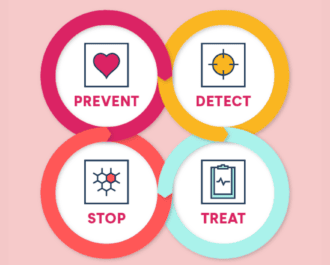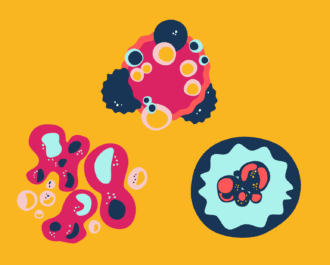
HELPING TO IMPROVE TREATMENT OPTIONS AND SURVIVAL RATES FOR BREAST CANCER
To day, the National Breast Cancer Foundation (NBCF) will kick-start its 25-year anniversary celebrations, reflecting on multiple research and fundraising milestones that have helped to improve treatment options, detection methods and enhance the quality of life of those affected by breast cancer.
day, the National Breast Cancer Foundation (NBCF) will kick-start its 25-year anniversary celebrations, reflecting on multiple research and fundraising milestones that have helped to improve treatment options, detection methods and enhance the quality of life of those affected by breast cancer.
Right now in Australia, one in eight women will be diagnosed with breast cancer in their lifetime[i] and eight women die from the disease every day[ii]. Since NBCF’s inception, new diagnoses of breast cancer have almost doubled with an increase from 9,556 cases in 1994[iii] to 18,235 cases in 2018[iv]. This is a result of a growing ageing population and other lifestyle factors. Improvements in breast cancer screening and early detection have also played an important role, thanks to the progression of research.
Professor Sarah Hosking, CEO of NBCF, stated, “We are thrilled with the progress that NBCF has achieved with our research and fundraising efforts over the past 25 years, in particular the role that we have played in improving the detection of breast cancer over this time.”
“Research into early detection has resulted in a National Breast Cancer Screening Program, which has helped Australians receive the right treatment at the right time – significantly improving survival rates.”
“We know that research is not just a stop gap for today, it is the key to stopping breast cancer in the future. The only way we will do this is through developing better methods to identify, treat and prevent the disease,” Professor Hosking continued.
To date NBCF has raised $162 million towards 514 life-changing research projects in Australia, funded entirely by the Australian public. This research has helped to develop better therapies, greater understanding of possible ways to stop the spread of breast cancer to other areas, and improved quality of life for patients and their families.
Karen Foster, who has had her own personal experience with breast cancer after being diagnosed in 2013, is celebrating her 10th year as a member of NBCF’s Speakers Network.
Karen said that she excited to share her own personal milestone in the same year as NBCF’s 25th anniversary.
“During my own diagnosis and treatment, I recognised that I was lucky to have access to the latest technology and treatments, which have been made possible through research,” she said.
“I believe we’re all on a breast cancer journey, some of us will have it and others touched by it. It’s everyone’s responsibility to support the research that will build each milestone along the journey towards no deaths.
Over its 25-year history, 1,361 researchers from 110 universities and institutions have completed the equivalent of 1230 years of breast cancer research thanks to NBCF. While research continues to improve treatment and early detection options, breast cancer remains the most commonly diagnosed cancer for women in Australia, taking the lives of eight women per day[v].
Reflecting on their accomplishments, NBCF’s Research Director Dr Chris Pettigrew noted improving the five-year survival rate for breast cancer from 76% to 90%[vi] as one of the key research milestones in their 25-year history. NBCF are dedicated to continuing to invest vital funds into world-class research to determine the causes of breast cancer, and develop new strategies for prevention and treatments.
Dr Chris Pettigrew stated, “Over the years, we have seen a number of landmark NBCF-funded research initiatives that have helped to saved lives. This includes discovering that tamoxifen can be used to reduce the risk of breast cancer recurring in women that are high-risk. NBCF research also led to the development of a 3D smart surgical glove to ensure all of the cancer cells are removed during surgery, minimising the future spread of cancer and preventing further operations. We look forward to continuing to work with the Australian public to drive more innovative research to so that, ultimately, we can stop deaths from breast cancer.”
“We are incredibly grateful for all of the research efforts that have helped NBCF get to where we are now. While we’ve conquered remarkable milestones, it’s important to remember breast cancer continues to be the most commonly diagnosed cancer in Australia and there is still much work to be done,” added Professor Hosking.
NBCF Chair Elaine Henry OAM, a driving force of NBCF who has been involved since its inception, congratulated all of the researchers, fundraisers and supporters who have helped shape NBCF into what it is today.
“Over the 25 years we have seen so many women and their families who have been impacted by breast cancer support and help to grow the cause and these are the people we should be rejoicing,” said Ms Henry.
As it veers towards the next exciting phase of its timeline, NBCF will fund innovative research focused on developing more targeted and personalised treatments; better detection and screening methods and new approaches to improve the quality of life of those affected by breast cancer. The community’s support is paramount to NBCF reaching its vision of Zero Deaths from breast cancer.
[i] https://breast-cancer.canceraustralia.gov.au/statistics
[ii] https://breast-cancer.canceraustralia.gov.au/statistics
[iii] Australian Institute of Health and Welfare, Australasian Association of Cancer Registries and NHMRC National Breast Cancer Centre 1998. Breast cancer survival in Australian women 1982-1994. AIHW cat. no. CAN 4. Canberra: Australian Institute of Health and Welfare (Cancer Series No. 9)
[iv] https://breast-cancer.canceraustralia.gov.au/statistics
[v] https://breast-cancer.canceraustralia.gov.au/statistics
v Australian Institute of Health and Welfare. Cancer compendium: information and trends by cancer type 2017. https://www.aihw.gov.au/reports/cancer/cancer-compendium-information-and-trends-by-cancer-type/report-contents/breast-cancer-in-australia
[vi] https://breast-cancer.canceraustralia.gov.au/statistics
More News Articles
View all News


